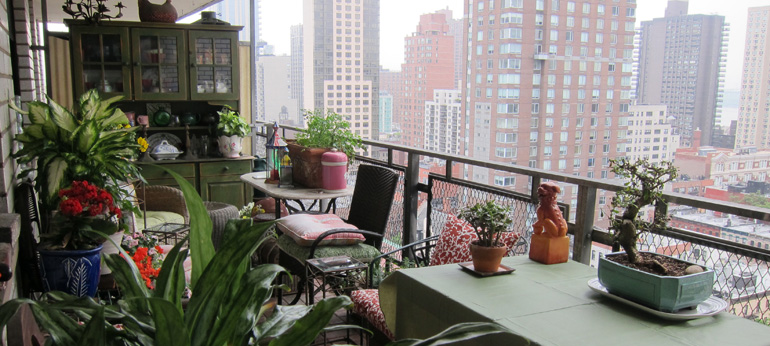Gotham Diary:
Still Happening
Monday, 23 May 2011
Until a few minutes ago, the balcony floor (not shown) was uncluttered neatly swept. Then I discovered an infestation of some kind in the ivy in the living room. How long the bugs have been at play, I’ve no idea. I think of ivy as hardy, but I’ve had a lot of trouble with it indoors. It seems to require very frequent watering, and now this. I set the plants on the balcony floor and watered them well with a mild solution of Ivory Soap. We’ll see. Meanwhile, that bonsai tree on the table — Kathleen tells that it’s a Fukien Tea Tree (“Fujian, you mean,” I couldn’t help correcting) — seems to be recovering from replanting. It arrived from an online merchant in a broken pot, and by the time that Kathleen decided that she couldn’t be bothered to ship it back, it was looking pretty pekid. Repotting was nothing less than traumatic, because the roots were bound to the pot by a coiled copper wire that didn’t want to let go. When most of the leaves curled up and turned black, I thought that we’d lost it, but the outlook improved a day or two later, with a burgeoning of new growth. I’ve never had anything to do with bonsai before and would probably not have taken it up on my own. But caring for Kathleen’s orphaned tea tree has already given me a taste of mandarin calm. If it flourishes, I can’t help believing, then so shall I.
I had hopes of taking Will to the Astor Court this weekend; I thought that he’d enjoy running around in there for a bit, even though it’s not very big. But it was not to be; after a few weeks of bouncing good health, he succumbed to some sort of infection and was not his jolly self. We thought that he might rally on Sunday afternoon, but by the time I reached his house in a taxi, his fever had spiked again, and I simply stayed in the cab and came home.
There was plenty to do. And I managed to do plenty, notwithstanding the temptations of Donna Leon’s new Guido Brunetti book, Drawing Conclusions. I finished that this morning. It’s one of her best — or perhaps it’s one of her most typical. The action is set entirely in Venice. Signorina Elettra Zorzi has at least two comic duets with Brunetti, and one of them is followed by a cabeletta which Brunetti muses on the beneficent small-bore corruption that makes society work in spite of itself (at least if you are a Venetian). There are two lines of plot stretching away from the dead body in the first chapter, so you know that one of them has to be a red herring. More than that I really cannot say at this time, because I might spoil a clue. While working in the kitchen, I watched Martin McDonagh’s In Bruges, the black comedy with Colin Farrell, Brendan Gleeson, and Ralph Fiennes that I had to see as part of my Thekla Reuten festival. (When I saw the movie in the theatre, I didn’t know who she was, if you know what I mean.) For the most part, however, I worked. It was discouraging to spend hours tidying up the balcony — really tidying it up, like never before, really — only to be kept from enjoying it by the unseasonable gloom. The weather could be worse, of course; the weather in Joplin, Missouri has been a lot worse. But we’ve all had enough of damp and chilly dark days. We’re so demoralized that it’s hard to look forward to anything. And now this: bugs! On en a ras le bol!Â
As for today, it was a Monday. It was impossible to believe, in the early afternoon hours, that I would do any of the things that I was supposed to do. I couldn’t imagine it! Somehow, force of habit took over. I don’t know how many feeds I read (or marked as read) before the outstanding number of unread feeds dropped below the thousand mark, but I’d guess that it was about five hundred. I read most of the Book Review, and most of it seemed inane. Was this just me? Was it the cold that I felt coming on? Was it my deep desire to dive into Diarmaid MacCulloch’s Christianity, a book that I’ve denied myself for some reason?
In prospect, reading Christianity seemed not just pleasant but dutiful. I’m finding Alan Jacobs’s book-length essay, The Pleasures of Reading in an Age of Distraction, unduly freighted with the titles of books that, in my opinion, don’t belong in or near discussions of Middlemarch. The fact that Jacobs is a biographer of CS Lewis goes far to explain this. As I read the book, which advocates, quite rightly, reading for pleasure, a vague sense of something amiss crystallized in the realization that too many writers about reading have forgotten — perhaps they’ve never known — that history at its best has a literary excellence that no fiction can match. I’m thinking of books like George Dangerfield’s The Strange Death of Liberal England or any of CV Wedgwood’s books about Seventeenth-Century Europe. William Doyle’s history of the French Revolution is not thrilling on absolutely every page, but its grasp of the tragic tensions of the upheaval is complete, and quite beyond the range of any conceivable cinema. Jonathan Lears’s recent Rebirth of a Nation has to be the most sobering, not to say depressing, history of the United States every written by an American. These books are packed with the excitement and suspense of gothic fiction — and they’re all true to life! At one point in In Bruges,  Colin Farrell’s character dismisses history (of which Bruges is so redolent) as “a lot of stuff that already happened.” I wanted to shake him: No! History is the stuff that is still happening!
I like to think that Donna Leon would agree with me.

